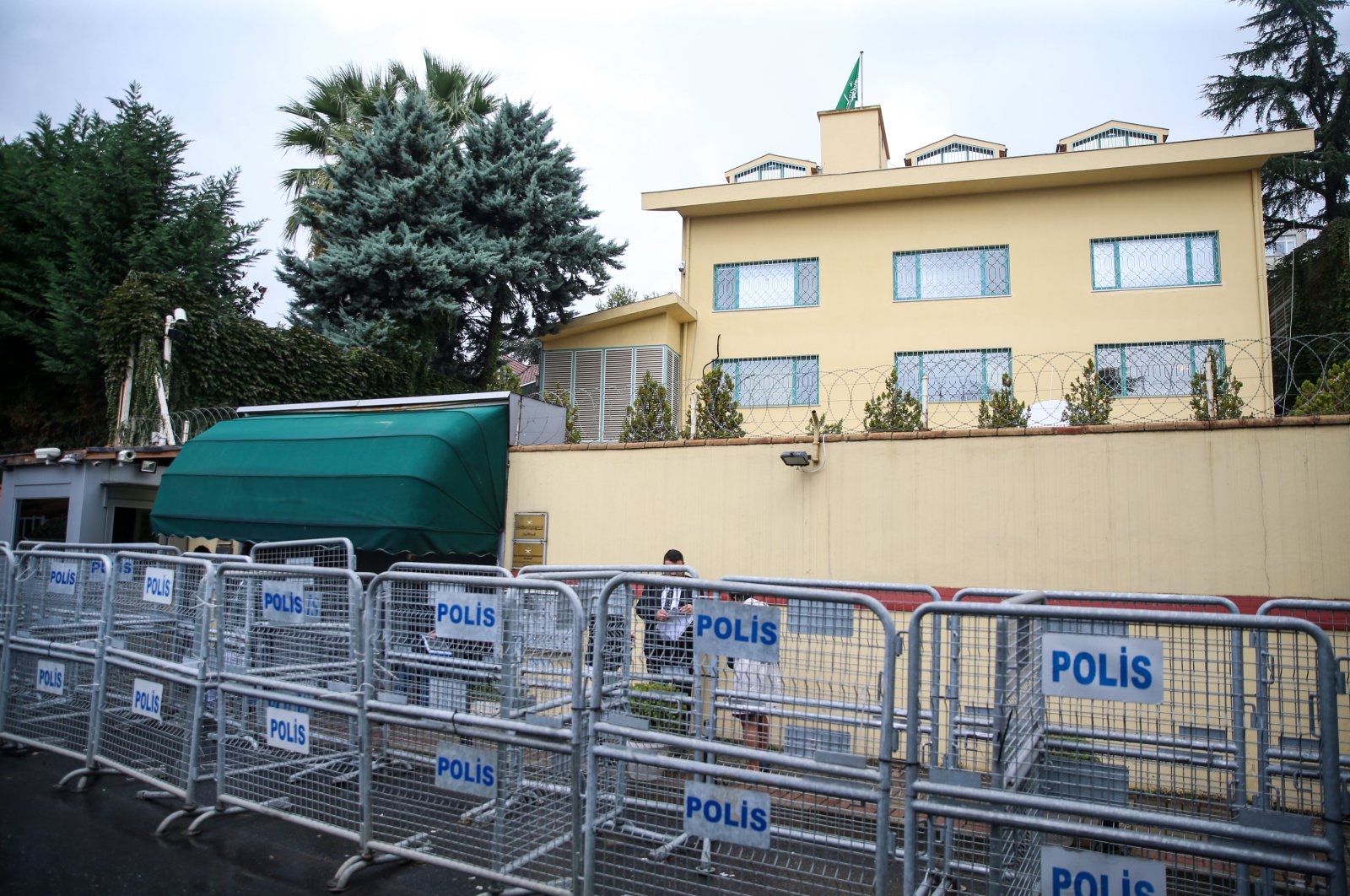- Merkel set for fourth term as chancellor as CDU leads parliamentary vote, exit polls say
- Turkey says it will send back ISIS prisoners even if citizenships revoked
- General Marchenko: ‘Mykolaiv was to be next city to fall, but Russia terribly failed’
- Ukrainian Armed Forces repel enemy attacks in four regions
- Somalia president hails lifting of arms embargo as government vows to wipe out al-Shabab militants
- Captured Somali pirates arrive in India to face trial over ship hijacking
- Martyred while serving nation: President Raisi dies in helicopter crash
- Stay Connected
Turkish court starts trial in absentia for 20 Saudi murderers in Khashoggi case
3 July, 2020 |
Filed under: All News,more news,Opinion,RECENT POSTS,Somali news |
Posted by: Abdillahi

The Saudi Consulate General Building, where Jamal Khashoggi was killed in Istanbul on Oct. 2, 2019 (AA File Photo)
ATurkish court will on Friday launch a trial in absentia of 20 Saudi nationals indicted for their role in the murder of dissident Saudi writer Jamal Khashoggi in 2018.
The indictment accuses Ahmed al-Asiri, ex-deputy chief of Saudi intelligence, and Saud al-Qahtani, a former adviser to Saudi Crown Prince Mohammed bin Salman, of “instigating premeditated murder with monstrous intent.”
Khashoggi was murdered inside Riyadh’s consulate in Istanbul on Oct. 2, 2018. He was getting papers to marry his Turkish fiancée Hatice Cengiz, who was waiting outside.
Eighteen others are accused of carrying out the killing with “monstrous intent and torture.”
Khashoggi was strangled to death and his body dismembered, says the indictment seen by DPA.
The remains of the Washington Post columnist, who was once close to the royal family but became a vocal critic of Prince Mohammed, were never found.
The prosecutor is seeking aggravated life sentences for all, the harshest term in Turkey since it abolished the death penalty in 2002.
The indictment was based on analysis of mobile phone records of the suspects, records of their entry to and exit from Turkey, records of their presence at the consulate, witness statements and analysis of Khashoggi’s phone, laptop and iPad, a statement by the prosecutor’s office said.
The evidence includes statements by Cengiz, who will attend the hearing with Agnes Callamard, the U.N. special rapporteur on extrajudicial killings who investigated Khashoggi’s death.
In December, Riyadh said five people were sentenced to death for the murder after a trial shrouded in secrecy. Khashoggi’s sons subsequently said they forgave his killers, paving the way for a reprieve.
The Istanbul trial “represents the best hope for justice” for Khashoggi “following a blatant miscarriage of justice in the Saudi courts,” said Erol Önderoğlu, Turkey representative for media watchdog Reporters Without Borders.
“I hope this criminal case in Turkey brings to light the whereabouts of Jamal’s body (and) the evidence against the killers,” his fiancee Hatice Cengiz, who was waiting for him outside the consulate on the day of his killing, told Reuters.
Cengiz said neither the trial nor the pardon followed due process. “No one can take the ‘trial’ that took place in Saudi Arabia legitimately; it was done in secret and the individuals sentenced are unnamed,” Cengiz said.
Source:dailysabah.com
All News
- Erdoğan unveils Turkey’s plan to build a spaceport in Somalia: report
- Israeli genocide in Gaza sees death toll cross grim 44,000 mark
- Lebanon’s housing sector crumbles, rental demand surges amid Israel-Hezbollah war
- Russia Fired Experimental Hypersonic Missile at Ukraine in Response to Western Long-Range Missiles – Putin
- ICC slaps Netanyahu, Gallant with arrest warrants for war crimes
- Donald Trump expected to consider recognizing Somaliland independence, former UK defense minister says
- US embassy in Kyiv shutters after ‘significant’ air attack threat By Tamsin Paternoster
- Opposition leader wins Somaliland presidential contest
- Israeli strikes rattle Beirut, as peace talks begin to take shape
- Zelenskyy says ‘missiles will speak for themselves’ as Biden OKs long-range use
- Home
- Merkel set for fourth term as chancellor as CDU leads parliamentary vote, exit polls say
- Turkey says it will send back ISIS prisoners even if citizenships revoked
- General Marchenko: ‘Mykolaiv was to be next city to fall, but Russia terribly failed’
- Ukrainian Armed Forces repel enemy attacks in four regions
- Somalia president hails lifting of arms embargo as government vows to wipe out al-Shabab militants
- Captured Somali pirates arrive in India to face trial over ship hijacking
- Martyred while serving nation: President Raisi dies in helicopter crash
- RSS
Contact@kasmaal.com